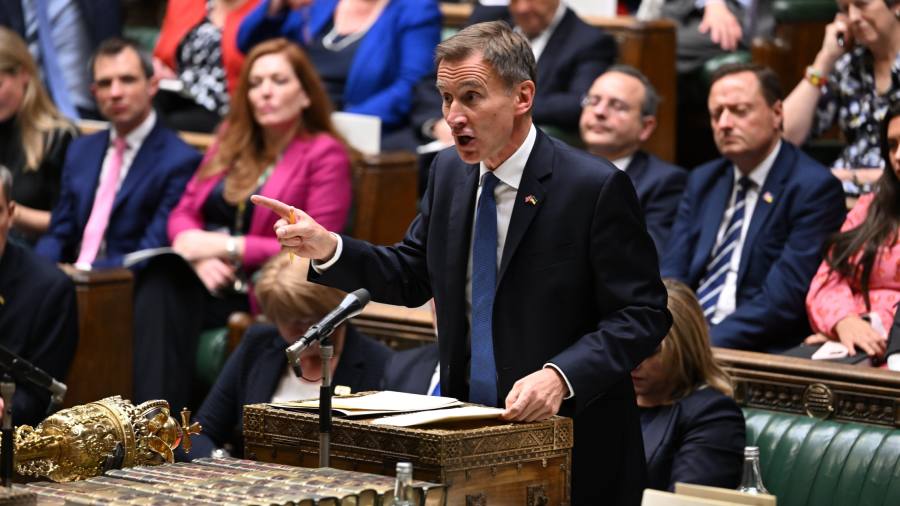
Tax experts have urged the UK’s new chancellor Jeremy Hunt to review the off-payroll working rules, known as IR35, after he cancelled plans to repeal controversial reforms.
In a week of government turmoil, Hunt on Monday scrapped his predecessor Kwasi Kwarteng’s proposal to liberalise IR35 in a move which would have made it easier to hire contractors but risked losing tax revenues.
However, tax advisers urged Hunt to address problems with IR35, such as the danger of overzealous application of the rules. “If risk averse [employers] make blanket determinations, or veer on the side of caution, contractors can find themselves incorrectly within IR35 with very few options for redress,” said Emma Rawson, technical officer at Association of Taxation Technicians, a professional body.
She called for the government to create “an independent appeal route” and make “the rules clearer, such that there is not the same worry among workers about ‘getting it wrong’”.
Rawson’s calls were echoed by Tim Stovold, head of tax at accountancy Moore Kingston Smith, who said the government should introduce “an objective and statutory test” for determining employment status.
“It must now be a priority for government to remove the colossal uncertainty that exists when determining employment status,” he said.
Changes made in 2017 for the public sector and 2021 for the private sector moved the responsibility for determining a worker’s IR35 tax status from individuals to the businesses benefiting from their services. When companies deem a contractor to be “inside IR35” the firm must deduct payroll taxes before paying the worker, when previously the contractor had decided if the rules applied.
The moves were widely seen as tightening the system to reduce tax avoidance. In 2019, HM Revenue & Customs estimated that only one in 10 people in the private sector who should have been paying tax under IR35 rules were doing so correctly.
However, other IR35 experts bemoaned the scrapping of Kwarteng’s plans. Andy Chamberlain, director of policy at IPSE, which represents independent professionals and the self-employed, described Hunt’s decision as a “huge blow” to thousands of self-employed contractors and the businesses that they work with.
“The reforms to IR35 have created a nightmare for businesses seeking to engage talent on a flexible basis, while simultaneously forcing individuals out of business altogether,” Chamberlain said.
“Our fear is this decision will lead to yet more work being offshored to other territories and more people being forced to work through unregulated umbrella companies,” he added.
A survey of contractors by the trade body IPSE conducted six months on from the 2021 reforms suggested that 35 per cent of an estimated 500,000 freelancers had left self-employment as a result.
The system has been criticised for being onerous for companies and forcing genuinely self-employed contractors to lose their rights to being their own boss.
Dave Chaplin, chief executive officer of IR35 Shield, a tax compliance firm, said the current off-payroll rules “appear to misclassify around half of the genuinely self-employed workers operating via limited companies”.
Hirers do not normally put IR35 contractors directly on to their payroll but work through payroll agencies called umbrella companies, which manage tax and pay for freelancers.
The U-turn will please those who claimed the Kwarteng plan would have reopened the door to increased tax avoidance. They include Edward Troup, a former executive chair of HMRC, who wrote in the Financial Times before the Hunt U-turn, that the Kwarteng proposal “raised a cheer from those happy to sidestep the proper payment of tax on employment”.
Troup later welcomed Hunt’s move. He said that the “real problem” with IR35 related to “the distinction between employment and self-employment which is a boundary defined by case law and HMRC practice”. He called for “a proper (and difficult) review of the definition of employment”.
The government said in a statement: “With or without the reforms, the underlying rules on off-payroll working are unchanged — anyone working like an employee should pay similar tax as someone who is directly employed.”
As well as cancelling plans to abolish recent IR35 reforms, Hunt set an April deadline for the end of the current government energy support schemes. He also indefinitely postponed proposals to reduce the basic rate of income tax from 20p in the pound to 19p and reversed a planned cut to dividend tax.